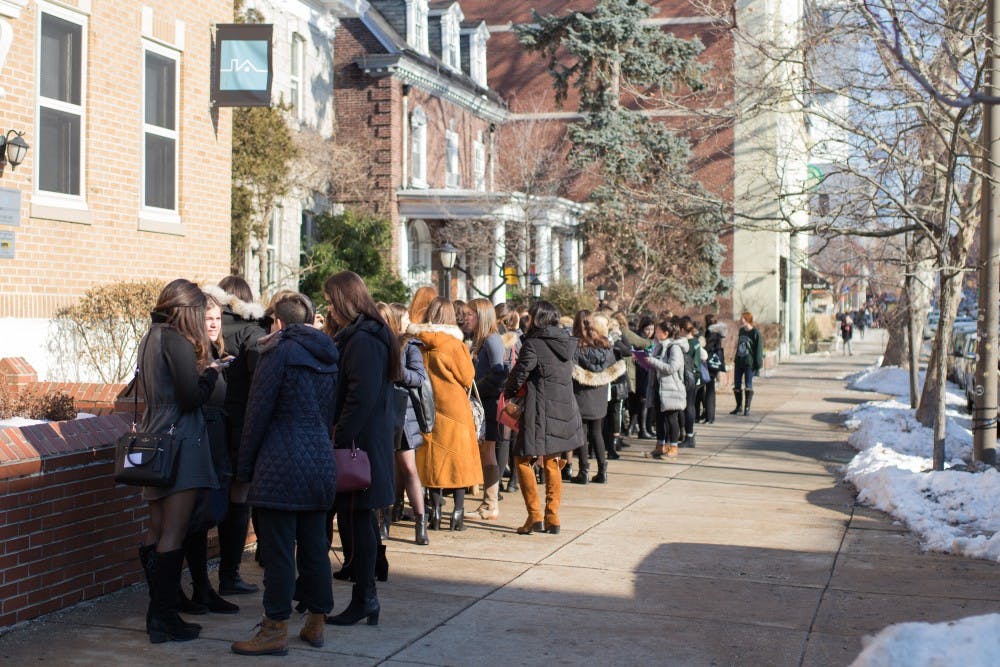
Whether it be the hundreds of women outside in the biting cold, the five-minute conversations filled with unfaltering smiles, or the late nights staying up second-guessing all the first impressions made throughout the previous hours — feeling stress during the five days of Penn sorority rush can often seem unavoidable.
But this year, the Panhellenic Council aimed to mitigate the stress of rush by prioritizing mental health.
“If you have any kind of social anxiety, social phobia, or general anxiety, it can be really hard to be in a really stimulating environment all day,” Vice President of Panhellenic Recruitment and College senior Andrea Klein said. “It’s not how you normally interact with people — it’s a very structured thing.”
This semester marked the first time that Panhel partnered with Reach-A-Peer Helpline to bring additional wellness resources to Potential New Members, or PNMs. RAPLine board members were present on the Friday and Saturday night before Bid Day in Houston Hall to talk in person with PNMs, who could also access their text service 24/7 and their phone line every night from 9 p.m. to 1 a.m.
“[Mental health was] definitely a bigger focus this year than it ever has been before,” Klein said.

Panhel also offered new hour-long group meditation sessions with Counseling and Psychological Services staff on Wednesday and Friday to help PNMs decompress.
On Jan. 9, the start of the Panhel rush process, PNMs attended Convocation and visited all eight sorority houses. Throughout the week, PNMs and sororities slowly narrow down their choices until Sunday's Bid Day when PNMs receive formal invitations, or “bids,” to join a sorority.
During the initial Convocation, Panhel worked with Penn Wellness to present these new resources and invited guest speaker Jessica Williams, the chief executive officer of Phired Up, to reassure PNMs that they could present themselves authentically.
“The ideal is that you’re showing your best self. Hopefully that’s someone you’re proud of and your best self comes across as someone that’s still you and not fake,” Wharton freshman Emelia Bartusiak said. “If you do that, you’re more likely to find a sorority that’s right for you.”
Another way Panhel tried to support PNMs' mental health was by providing additional training to the Rho Gammas, who are recruitment counselors for small groups of PNMs. Rho Gammas received training from CAPS staff last semester on tactics such as “active listening,” Klein said.
“The recruitment guides make it very clear that you can talk to them at any point. They have no affiliation to the sororities during the week and don’t influence the decisions,” Engineering freshman Selina Nie said. She was not aware, however, that the Rho Gammas had received CAPS training.

Still, some PNMs said they felt worried that they would not receive bids. A 2016 study on sorority rush conducted by Penn psychologist Melissa Hunt suggested a correlation between freshman women’s self-esteem throughout the academic year and their invitations into sororities.
Wharton senior Phillip Isom, co-director of peer counseling group Penn Benjamins, advised anyone rushing to not let the results “define [them] as a person.”
Although Penn Benjamins used the first few weeks of the semester for peer counselor training, they are interested in partnering with Panhel in the future to offer support for PNMs.
“In the moment, going through rush does seem like your entire life and really serious," Isom said. "But as I look back on it senior year and ask myself who are my closest friends and what are the relationships and experiences I really value, yes, some of them have to do with Greek Life, but a lot of them don’t.”
The Daily Pennsylvanian is an independent, student-run newspaper. Please consider making a donation to support the coverage that shapes the University. Your generosity ensures a future of strong journalism at Penn.
Donate






